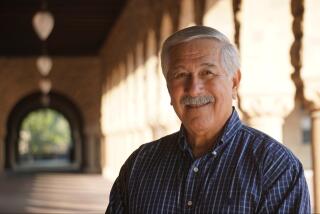UCSB Grad Student’s Album Offers Dramatic History
- Share via
Can drama, history and politics be served on a platter at 33 r.p.m?
It can, according to Rob Rosenthal, if you mix in some spicy rock ‘n’ roll.
The question is also academic since Rosenthal’s album, “Seattle 1919,” is based on his 350-page master’s thesis.
It has taken Rosenthal, a doctoral candidate at UC Santa Barbara and an advocate for the homeless, a full decade to complete the album, which is based on the true story of the Seattle General Strike of 1919.
All Facets of Recording
To see the project through, Rosenthal, 36, not only wrote the music and lyrics for the album’s 21 songs, but he also moved to Seattle twice to do research, created an independent record company, learned audio engineering, investigated album cover design and printing, and convinced several musicians to work on the project without pay.
It all began with his 350-page master’s thesis about the 1919 strike in Seattle, which he describes as “the most radical event in U.S. labor history.” More than 35,000 workers from 102 unions joined in the strike, vowing to run the city themselves. But the rebellion was diffused, leaving the workers wondering which way to turn.
Telling the saga in musical form is especially appropriate, Rosenthal believes, because the “explosion and defiance that went into that strike is just like the spirit and energy of rock ‘n’ roll.”
“Seattle 1919” has been compared to the classic political ballads of Woody Guthrie and has been garnering praise both for its music and dramatic history lesson. One music critic said it was “effectively cross-blending (Bruce) Springsteen and ‘Reds’. “ Another loved its “driving, relentless, pulsing beat,” while a third termed the musical performances “faultless.”
Noted labor historian and author Jeremy Brecher called “Seattle 1919” “a rare and precious creation” which succeeds in “impressively expanding the ability of rock music to deal with complex themes in a sustained way.”
Songs From Interviews
“Many of the songs on the album just came out of the interviews I did with people who were there,” Rosenthal says. “For example, one day I was talking to this terrific guy, an old longshoreman named Earl George. I said to him, ‘So what was it like the day of the strike?’ He said, ‘Nothing moved but the tide.’ I thought, ‘Well, there’s a song right there.’ ”
The late Earl George was also the inspiration for the powerhouse rocker, “The Road Forks Here,” which describes his political awakening during the strike.
Despite the emphasis on the story, music is more than a footnote to the thesis. Rosenthal kept rock at the core, but the album also includes ballads, bluegrass and folk.
When he began work on his thesis and the songs in 1977, Rosenthal did not have plans for an album. But after returning from his first stay in Seattle, he got what he laughingly calls “a put-up or shut-up letter” from Mike Rawson, an old friend and fellow musician then attending law school in the Bay Area.
Still thinking the record was “a million to one shot,” Rosenthal moved to Seattle in 1980 and Rawson joined him for eight months to work on the music.
Forming The Fuse
When Rosenthal returned to Santa Barbara in 1981, he began to recruit the band that became The Fuse: Diane Matsinger, Mike Ledbetter, Terry Neal Barham, Steve Molle, Jonathon Paulk and Billy Bowne. Rosenthal and the band practiced once a week so members could play in other bands and work their other jobs. The album, recorded at four different times over a two-year period and at three different studios, is available in Santa Barbara record stores and at Aaron, Rhino and Rockaway record stores in Los Angeles.
Now that album is finished and the dream realized, what next?
Rawson is currently working on a script to make “Seattle 1919” into a play.
Meanwhile, Rosenthal, who next fall will become a professor of sociology at Wesleyan University in Connecticut, is burning the midnight oil again, this time facing a deadline on his doctoral dissertation--on homelessness.
More to Read
The biggest entertainment stories
Get our big stories about Hollywood, film, television, music, arts, culture and more right in your inbox as soon as they publish.
You may occasionally receive promotional content from the Los Angeles Times.







